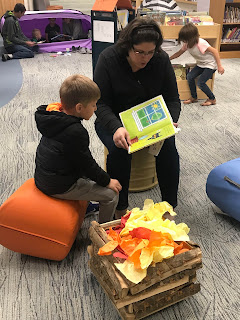Camp McKinley:
We had a great turnout (around 250 people!) for our "Camp McKinley" last night. A huge thank you to Chelsea Van Roekel, Dani Rypka, Danielle Nystrom, Julie Bauer, Kathy Feltes, Sami Nelson, Laurie Wolhart, and Madie Conley for your work around this night. Another thank you to Sylvia & Nura for being available for language support. What a great night!
Dear Complainer...
A great blog entry from the Energy Bus on complaining & blaming. Take a minute to read - great reminders! Click here to access the blog entry
How Does Communication Fit into the Literacy Puzzle - Guest Blogger Amanda Wood
Check out a great blog entry from Amanda Wood on how communication and literacy fit together.
September ORD Data:
Below is a link to our September Office Referral Data (ORD). This data is collected to examine trends in behaviors, but also provide supports for individual students. Our McKinleyStrong Team analyzed the data last night and found the following observations:
- The 11-1pm is our highest time for referrals. We thought this could be possibly be due to a large amount of kids in one space (lunchroom), volume in lunchroom, students being away from a teacher for the first time during the day, or just that it's their first unstructured time during the day.
- The team found that physical aggression is extremely high. This matches previous years, too. We talked about possible reasons and determined we would track who is being physical and figure out how to support them best.
September ORD Data
Reserve November 1 - SHHH, it's a SECRET:
Keep this secret.. as we will be announcing next week. We did fill the jar! Woo hoo! Our team met last night and determined that November 1st will be our McKinleyStrong Celebration. More information will come on this; however, plan on an activity on this day. More information to come!
Life Space Crisis - Guest Blogger Danielle Nystrom:
Foundation #2: Understanding the Dynamics of the Conflict Cycle:
The second foundation that LSCI is built on is “Understanding the Dynamics of the Conflict Cycle”. This is especially important when trying to understand the timeline of an event. The conflict cycle is made up of four parts and occurs in a cyclical rotation. First, the child brings their values and world views into a given stressful event. This event or stress causes an emotion to be felt or experienced. An internal dialogue occurs based on the thoughts and feelings. This internal dialogue leads to some type of observable behavior. This could be anything from an eye roll to flipping a table. Once the observable behavior occurs, there is some kind of response from the adult that is around. This response will either keep the stress level the same or will increase the amount of stress the child is experiencing. It is imperative that the adult involved in the situation be responsive to the child’s needs; not reactive (yelling, punishment, etc). If the adult reacts to the behavior, the students’ stress level will increase, a new emotion will be experienced, followed by a more intense behavior. This cycle will continue if the adult continues to match the student; and the stress level will continue to rise. As stated earlier, the adult has multi-dimensional thinking and the ability to manage and control their emotions. The adult needs to be the thermostat in the event and work to keep the stress at a level place to assist the student in draining off their intense emotions.
Understanding the conflict cycle is important as it helps the adult involved understand how the child is feeling. It is also very helpful in assisting with determining the timeline of an event or crisis situation. The conflict cycle lends itself to this process. The adult can ask simple questions to gather information. Questions include: What happened? How did you feel? What were you thinking or feeling? What did you do? How did they respond? These questions allow the adult to hear the perception of the student and understand the feelings that the child was experiencing.
Check out this great example of going around the conflict cycle… a few times! Breakfast Club
Building Weekly Newsletter:
Click here to access the building weekly newsletter
Have a great weekend, everyone! Keep your fingers crossed for NO SNOW!
-Justin









No comments:
Post a Comment